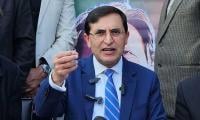No one is willing to claim the ownership of Karachi, which is why the city has now become ungovernable and unmanageable. The local government only controls 34 per cent of the mega city. The city should be under one strong authority in order to improve its affairs.
These views were expressed by journalist and political analyst Mazhar Abbas, who was speaking at a seminar, titled ‘Karachi’s political landscape’, organised by the University of Karachi (KU) Department of International Relations, under the Graduate Studies’ Discussion Forum established in 1996.
According to a statement issued, the speaker started the session by highlighting the lack of ownership of the city, stating that even though Karachi was contributing a major share to the economy of Pakistan, no one was ready to take the ownership of Karachi be they the federal, provincial, or local governments.
He highlighted that the budget allocated for the city was only a half of what it needed as the population of Karachi was more than 35 million but it was shown to be 16 million in the 2017 census.
The journalist maintained that due to flawed census count and the resulting short allocation of funds, the city had been witnessing a rise in infrastructure problems, criminal activities and other social issues.
Tracing the political history of Karachi, Abbas said that the migrants who came to Karachi from India at the time of the Partition in 1947 had a right-wing tilt. As a result, the city was politically a stronghold of the Muslim League. However, with the decline of the Muslim League, the influence of religious conservative political parties, such as the Jamaat-e-Islami and Jamiat Ulema-e-Pakistan rose.
The journalist said that a historical role of Karachi in the country’s political landscape had been that of the city of the opposition, which actively took part in various anti-government campaigns.
To prove his point, Abbas cited various movements that had got tremendous support from people of Karachi. The movements included various student movements, Fatima Jinnah’s campaign against Ayub Khan and even Bhutto’s anti-Ayub movement.
He also opined that a new era in the politics of Karachi began after 1972 when the city witnessed riots as a result of the Bhutto government’s policies of implementing quota system and language bill. He was also of the opinion that the eventual emergence of the Muttahida Qaumi Movement was a result of those riots.
Abbas also explained how major regional events like the Iranian Revolution and Afghan War in 1979 impacted Karachi in terms of sectarian and ethnic violence. The city had to bear the brunt of the Kalashnikov and drug cultures as arms and drugs were imported to the city, after which different mafias and underworld groups emerged who started controlling the city’s politics.
Abbas stressed the need for strong and empowered local body system free from any type of political influence and intervention. He observed that the mayor should be empowered and given full authority of the city and its institutions.
He informed the audience that currently, the mayor had authority over just 34 per cent of the city and the rest was being controlled by authorities like the cantonment boards, Defence Housing Authority and railways.
The speaker also called for development of civic institutions of the city under a strong local body system. He said that coordination between federal, provincial, and local governments could solve Karachi’s problems.
Mazar-e-Quaid can be seen in this image in Karachi. — AFP/FileRose WaterThe Sanat Initiative is hosting an art...
Commandos of the Special Security Unit of the Sindh police seen posing in this undated...
This image shows students attempting the MDCAT exam on September 22, 2024. — X@kmuofficial_A Malir court has granted...
A representational image of a robbery at gunpoint. — APP/FileIn terms of snatchings and theft of vehicles in...
This representational image shows a student reading out a book before her class-mates. — AFP/File The long-standing...
The front side of the Sindh High Court building in Karachi. — AFP/FileThe Sindh High Court on Tuesday issued notices...







